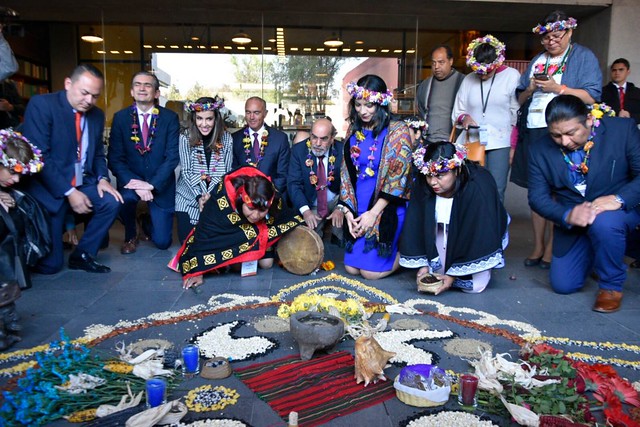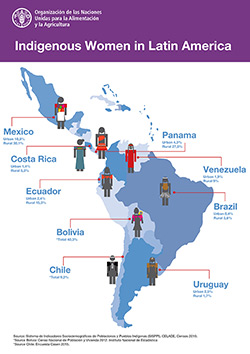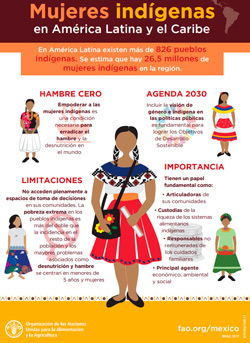High Level Forum “Empowerment of Indigenous Women for the eradication of hunger and malnutrition in Latin America and the Caribbean”
Hybrid Event, 12/01/2018 - 13/01/2018

Photos
Background
The Latin America and the Caribbean region is inhabited by more than 826 indigenous peoples, accounting approximately for 45 million people (around 8.3 percent of the population of the region). Indigenous peoples often face a structural discrimination in comparison with the non-indigenous population and confront high rates of poverty, low access to health services, chronic undernourishment, high rates of child mortality, high percentage of illiteracy and scarce opportunities of political participation and representation.
According to a study of the Economic Commission for Latin America and the Caribbean (ECLAC, 2006), in the majority of the examined countries, the incidence of extreme poverty in indigenous populations is more than double than that of the rest of the population. Likewise, the highest incidence of hunger and malnutrition are found among children under 5 years and women that belong to ethnic minorities and poor households located in rural areas. Recent estimates indicate that close to 15 percent of the total population that faces food insecurity and extreme poverty are indigenous.
To ensure no one is left behind, the 2030 Agenda for Sustainable Development must realize the rights of indigenous peoplesacross all the Goals. Indeed, among its guiding principles, the 2030 Agenda includes social inclusion as a crosscutting strategy, aiming at identifying groups that have been typically marginalized from the development experience. This is especially relevant for indigenous peoples, and presents a unique opportunity to effectively count with their participation in the implementation of the 2030 Agenda.
This year as we mark the 10th anniversary of the United Nations Declaration on the Rights of Indigenous Peoples, which establishes the minimum standards guaranteed for them, the ongoing marginalization of indigenous peoples still derives form the lack of respect of their rights. This is particularly true for indigenous women, who face a multifaceted discrimination both inside and outside their communities, which places them in situations of high vulnerability and with very limited opportunities of effectively exercising their rights.
Building up on its Policy on Gender Equality, FAO promotes gender equality and women’s empowerment as key strategies to achieve its mandate of reducing poverty and eradicating hunger worldwide.
Indeed, the social and economic empowerment of indigenous women is not only a central subject, but it is also a necessary condition for the eradication of hunger and malnutrition the world. In this context, the empowerment of indigenous women requires the improvement of their legal and social status in order to end the triple discrimination that they suffer in terms of poverty, gender and ethnicity.
Likewise, it is essential to recognize the drivers of this triple discrimination in the frame of local uses and practices. Recognizing the rights of indigenous women at the community level can foster the promotion public policies to enhance leadership and access to rights, including the right to development with identity and Free, Prior and Informed Consent (FPIC).
This High Level Forum will address the empowerment of indigenous women using a rights and gender equality approach that explicitly consider factors like ethnicity, gender, age and social status.
Objective
The objective of the Forum is to develop public policy recommendations to (i) promote gender equality and respect of the rights of indigenous women; (ii) strengthen the decision making of indigenous women; and (iii) reduce the poverty and discrimination gap of indigenous women.
The participant will be policy makers, indigenous organizations and indigenous women organizations, civil society, academia and research centres. Aspects such as malnutrition, poverty, climate change, the protection of biodiversity, indigenous food systems, access to loans and productive inputs will be analysed.
Participants
To ensure a widest participation and inclusion of the different voices of indigenous women in Latin America and the Caribbean, the following representatives have been invited:
- Representatives from indigenous peoples regional organizations;
- High level authorities from the executive and legislative sectors from 12 countries (Bolivia, Brazil, Colombia, Costa Rica, Guatemala, Ecuador, El Salvador, Honduras, Nicaragua, Panamá, Paraguay y Peru);
- Representatives of international organizations;
- Representatives from Mexican institutions.
Documents
Documents
- Political declaration (spanish only)
- Agenda (spanish only)
Infographics
Photos
Presentations
- Parlamentarias Indígenas y Políticas de Interculturalidad
- Liderazgo mujeres indígenas y ciudadanía INAMU Ragión Brunca, Costa Rica
- Empoderamiento económico desde el estado
- Las experiencias de las transferencias condicionadas en Paraguay
- Los pueblos indígenas y la Agenda 2030
- Consejo Nacional para la Igualdad de los pueblo y nacionalidades Ecuador
- Políticas interculturales en base a las necesidades de la mujer indígena
- Presentación de Visitación Asprilla MINAGRICULTURA Colombia
- Políticas sociales y mujer indígena
- Agua y el pueblo wayuu: la gestión de la escases
- La experiencia de gobernanza de territorios indígenas en Panamá
- Interculturalidad dentro del ODS2: Hambre Cero
- Interculturalidad dentro del ODS2: Hambre Cero
- Interculturalidad dentro del ODS2: Hambre Cero. Ejemplo Honduras




